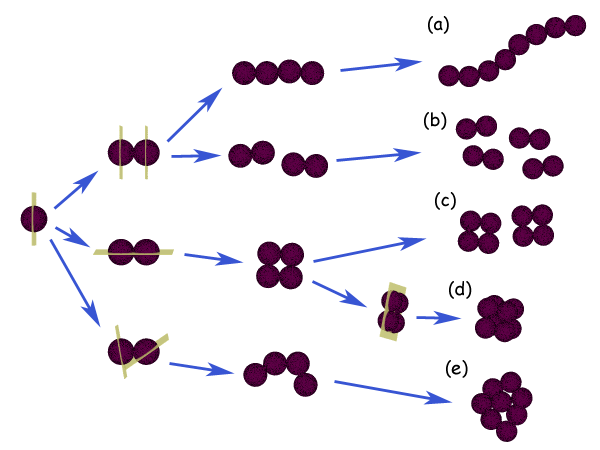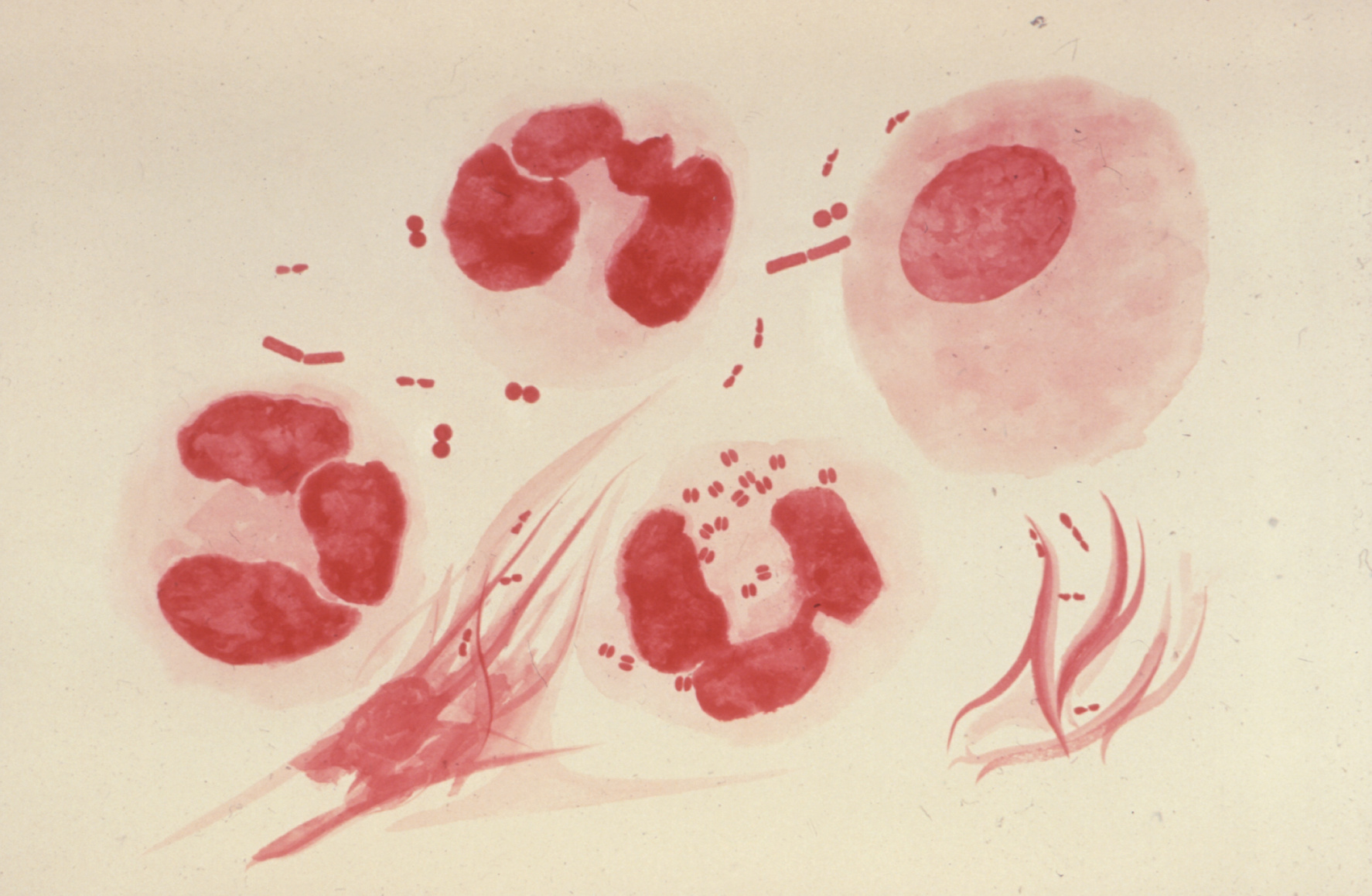Diplococcus on:
[Wikipedia]
[Google]
[Amazon]
 A diplococcus (plural diplococci) is a round
A diplococcus (plural diplococci) is a round


 Phylum: Proteobacteria
Class: Gammaproteobacteria
Order: Pseudomonadales
Family: Moraxellaceae
Genus: ''Moraxella''
The genus ''Moraxella'' belongs to the family ''Moraxellaceae.'' This genus, ''Moraxellaceae,'' comprises gram-negative coccobacilli bacteria: ''Moraxella lacunata, Moraxella atlantae, Moraxella boevrei, Moraxella bovis, Moraxella canis, Moraxella caprae, Moraxella caviae, Moraxella cuniculi, Moraxella equi, Moraxella lincolnii, Moraxella nonliquefaciens, Moraxella osloensis, Moraxella ovis and Moraxella saccharolytica, Moraxella pluranimalium''. However, only one has a morphology of diplococcus, ''Moraxella catarrhalis. M. catarrhalis'' is a salient pathogen contributing to infections in the human body.
Phylum: Proteobacteria
Class: Gammaproteobacteria
Order: Pseudomonadales
Family: Moraxellaceae
Genus: ''Moraxella''
The genus ''Moraxella'' belongs to the family ''Moraxellaceae.'' This genus, ''Moraxellaceae,'' comprises gram-negative coccobacilli bacteria: ''Moraxella lacunata, Moraxella atlantae, Moraxella boevrei, Moraxella bovis, Moraxella canis, Moraxella caprae, Moraxella caviae, Moraxella cuniculi, Moraxella equi, Moraxella lincolnii, Moraxella nonliquefaciens, Moraxella osloensis, Moraxella ovis and Moraxella saccharolytica, Moraxella pluranimalium''. However, only one has a morphology of diplococcus, ''Moraxella catarrhalis. M. catarrhalis'' is a salient pathogen contributing to infections in the human body.
 Phylum: Firmicutes
Class: Bacilli
Order: Lactobacillales
Family: Streptococcaceae
Genus: Streptococcus
Species: ''Streptococcus pneumoniae''
The species ''Streptococcus pneumoniae'' belongs to the genus ''Streptococcus'' and the family ''Streptococcaceae.'' The genus ''Streptococcus'' has around 129 species and 23 subspecies that benefit many microbiomes on the human body. There are many species that show non-pathogenic characteristics; however, there are some, like ''S. pneumoniae,'' that exhibit pathogenic characteristics in the human body.
Phylum: Firmicutes
Class: Bacilli
Order: Lactobacillales
Family: Streptococcaceae
Genus: Streptococcus
Species: ''Streptococcus pneumoniae''
The species ''Streptococcus pneumoniae'' belongs to the genus ''Streptococcus'' and the family ''Streptococcaceae.'' The genus ''Streptococcus'' has around 129 species and 23 subspecies that benefit many microbiomes on the human body. There are many species that show non-pathogenic characteristics; however, there are some, like ''S. pneumoniae,'' that exhibit pathogenic characteristics in the human body.
 Phylum: Firmicutes
Class: Bacilli
Order: Lactobacillales
Family: Enterococcaceae
Genus: ''Enterococcus''
The genus ''Enterococcus'' belongs to the family ''Enterococcaceae.'' This genus is divided into 58 species and two subspecies. These gram-positive, coccoid bacteria were once thought to be harmless to the human body. However, within the last ten years, there has been an influx of nosocomial pathogens originating from ''Enterococcus'' bacteria.
Phylum: Firmicutes
Class: Bacilli
Order: Lactobacillales
Family: Enterococcaceae
Genus: ''Enterococcus''
The genus ''Enterococcus'' belongs to the family ''Enterococcaceae.'' This genus is divided into 58 species and two subspecies. These gram-positive, coccoid bacteria were once thought to be harmless to the human body. However, within the last ten years, there has been an influx of nosocomial pathogens originating from ''Enterococcus'' bacteria.
 A diplococcus (plural diplococci) is a round
A diplococcus (plural diplococci) is a round bacterium
Bacteria (; singular: bacterium) are ubiquitous, mostly free-living organisms often consisting of one biological cell. They constitute a large domain of prokaryotic microorganisms. Typically a few micrometres in length, bacteria were amon ...
(a coccus
A coccus (plural cocci) is any bacterium or archaeon that has a spherical, ovoid, or generally round shape. Bacteria are categorized based on their shapes into three classes: cocci (spherical-shaped), bacillus (rod-shaped) and spiral ( of whi ...
) that typically occurs in the form of two joined cells.
Types
Examples ofgram-negative
Gram-negative bacteria are bacteria that do not retain the crystal violet stain used in the Gram staining method of bacterial differentiation. They are characterized by their cell envelopes, which are composed of a thin peptidoglycan cell wa ...
diplococci are '' Neisseria spp.'' and ''Moraxella catarrhalis
''Moraxella catarrhalis'' is a fastidious, nonmotile, Gram-negative, aerobic, oxidase-positive diplococcus that can cause infections of the respiratory system, middle ear, eye, central nervous system, and joints of humans. It causes the inf ...
.'' Examples of gram-positive
In bacteriology, gram-positive bacteria are bacteria that give a positive result in the Gram stain test, which is traditionally used to quickly classify bacteria into two broad categories according to their type of cell wall.
Gram-positive bact ...
diplococci are ''Streptococcus pneumoniae
''Streptococcus pneumoniae'', or pneumococcus, is a Gram-positive, spherical bacteria, alpha-hemolytic (under aerobic conditions) or beta-hemolytic (under anaerobic conditions), aerotolerant anaerobic member of the genus Streptococcus. They ar ...
'' and ''Enterococcus'' spp.
Presumably, diplococcus has been implicated in encephalitis lethargica.
Taxonomy
Gram-negative diplococci


''Neisseria'' spp.
Phylum: Proteobacteria Class: Betaproteobacteria Order: Neisseriales Family: Neisseriaceae Genus: ''Neisseria'' The genus ''Neisseria'' belongs to the family Neisseriaceae. This genus, ''Neisseria,'' is divided into more than ten different species, but most of them are gram negative and coccoid. The gram-negative, coccoid species include: ''Neisseria cinerea, Neisseria gonorrhoeae, Neisseria polysaccharea'', ''Neisseria lactamica'', ''Neisseria meningitidis'', ''Neisseria mucosa'', ''Neisseria oralis and Neisseria subflava.'' Of these ''Neisseria species,'' the most common, pathogenic species are ''N. meningitidis'' and ''N.gonorrhoeae.''''Moraxella catarrhalis''
 Phylum: Proteobacteria
Class: Gammaproteobacteria
Order: Pseudomonadales
Family: Moraxellaceae
Genus: ''Moraxella''
The genus ''Moraxella'' belongs to the family ''Moraxellaceae.'' This genus, ''Moraxellaceae,'' comprises gram-negative coccobacilli bacteria: ''Moraxella lacunata, Moraxella atlantae, Moraxella boevrei, Moraxella bovis, Moraxella canis, Moraxella caprae, Moraxella caviae, Moraxella cuniculi, Moraxella equi, Moraxella lincolnii, Moraxella nonliquefaciens, Moraxella osloensis, Moraxella ovis and Moraxella saccharolytica, Moraxella pluranimalium''. However, only one has a morphology of diplococcus, ''Moraxella catarrhalis. M. catarrhalis'' is a salient pathogen contributing to infections in the human body.
Phylum: Proteobacteria
Class: Gammaproteobacteria
Order: Pseudomonadales
Family: Moraxellaceae
Genus: ''Moraxella''
The genus ''Moraxella'' belongs to the family ''Moraxellaceae.'' This genus, ''Moraxellaceae,'' comprises gram-negative coccobacilli bacteria: ''Moraxella lacunata, Moraxella atlantae, Moraxella boevrei, Moraxella bovis, Moraxella canis, Moraxella caprae, Moraxella caviae, Moraxella cuniculi, Moraxella equi, Moraxella lincolnii, Moraxella nonliquefaciens, Moraxella osloensis, Moraxella ovis and Moraxella saccharolytica, Moraxella pluranimalium''. However, only one has a morphology of diplococcus, ''Moraxella catarrhalis. M. catarrhalis'' is a salient pathogen contributing to infections in the human body.
Gram-positive diplococci
''Streptococcus pneumoniae''
 Phylum: Firmicutes
Class: Bacilli
Order: Lactobacillales
Family: Streptococcaceae
Genus: Streptococcus
Species: ''Streptococcus pneumoniae''
The species ''Streptococcus pneumoniae'' belongs to the genus ''Streptococcus'' and the family ''Streptococcaceae.'' The genus ''Streptococcus'' has around 129 species and 23 subspecies that benefit many microbiomes on the human body. There are many species that show non-pathogenic characteristics; however, there are some, like ''S. pneumoniae,'' that exhibit pathogenic characteristics in the human body.
Phylum: Firmicutes
Class: Bacilli
Order: Lactobacillales
Family: Streptococcaceae
Genus: Streptococcus
Species: ''Streptococcus pneumoniae''
The species ''Streptococcus pneumoniae'' belongs to the genus ''Streptococcus'' and the family ''Streptococcaceae.'' The genus ''Streptococcus'' has around 129 species and 23 subspecies that benefit many microbiomes on the human body. There are many species that show non-pathogenic characteristics; however, there are some, like ''S. pneumoniae,'' that exhibit pathogenic characteristics in the human body.
''Enterococcus spp.''
 Phylum: Firmicutes
Class: Bacilli
Order: Lactobacillales
Family: Enterococcaceae
Genus: ''Enterococcus''
The genus ''Enterococcus'' belongs to the family ''Enterococcaceae.'' This genus is divided into 58 species and two subspecies. These gram-positive, coccoid bacteria were once thought to be harmless to the human body. However, within the last ten years, there has been an influx of nosocomial pathogens originating from ''Enterococcus'' bacteria.
Phylum: Firmicutes
Class: Bacilli
Order: Lactobacillales
Family: Enterococcaceae
Genus: ''Enterococcus''
The genus ''Enterococcus'' belongs to the family ''Enterococcaceae.'' This genus is divided into 58 species and two subspecies. These gram-positive, coccoid bacteria were once thought to be harmless to the human body. However, within the last ten years, there has been an influx of nosocomial pathogens originating from ''Enterococcus'' bacteria.
Pathogenicity
Many diplococci have species or strains that exhibit pathogenic characteristics. Examples of gram-negative pathogenic diplococci include ''N.gonorrhoeae'' and ''N. meningitidis.'' Examples of gram-positive pathogenic diplococci include S''treptococcus pneumoniae'' and some species of ''Enterococcus'' bacteria.References
{{Bacteria Bacteria de:Diplokokken